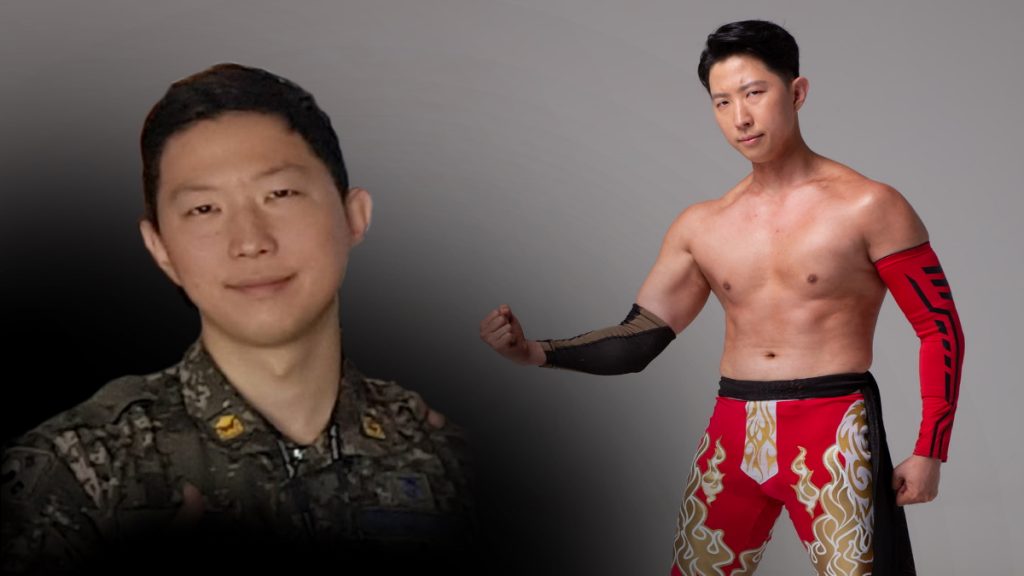Hong Dong Hee describes the modern pro wrestling scene in South Korea as “really, really weak” and “really, really dead.” As Shiho the “Red Fox” of the ring, he hopes to lead a pro wrestling revolution in South Korea and eventually bring the sport back to the heights it saw there from the 1970s to the 1990s.
In the post Korean War era, Shiho feels that wrestling entertainment provided a much needed escape. Homegrown South Korean wrestlers flourished and talent was exchanged back and forth with Japan. Stadium were sold out and legends such as Kintaro Ohki and Rikidozan were household names in the country.
Shiho cannot settle on a specific hard reason for the wane of popularity in the country, but the evidence is undeniable. It has all but ceased to exist there.
Although there were no home grown options at the time, Shiho became a fan on the cusp of the WWE Ruthless Aggression era in 2001 when he was 11 years old. He says that the WWE definitely was popular in South Korea then, with programming being readily available on TV and T-Shirts in stores which he bought many of. (There is no pro wrestling in North Korea, as recently discussed in the Dark Side of the Ring episode, Collision in Korea.)
After taking a break from wrestling during high school, he started watching again while in university. It was then in 2011 that Shiho stumbled upon, at the time, South Korea’s only pro wrestling product: Professional Live Action. He started in training with PLA under wrestler Hyena. Now, given hindsight as an internationally trained professional Shiho noted that he views them as “stuck in their own Korean way.” Despite this he was mesmerized like never before by seeing the “real life superhero” antics live in person.
Shiho would then come into contact with Jo Kyung Ho, who returned to his home of South Korea after training in Japan. Ho became his primary trainer.
Shiho the “Red Fox” of the ring.
Now Shiho has his own promotion, Pro Wrestling Society. Based out of Seoul, it’s the foremost promotion in South Korea and his pro wrestling allegiance is directly tied to it and South Korea. The added connection is that his day job is work as a translator for the South Korean and American Air Forces.
It is for this reason that Shiho has not toured the international hubs of the industry to pursue his dream and also why he has yet to produce a piece of merch for himself. He has to run his wrestling ventures by military higher ups and likes to keep it to a minimum of requests.
Shiho puts his PWS merch before his own.
However, if it were not for pro wrestling, Shiho would not be in the position he is in with these armies. “It was my life. I memorized every name and every profile. I started studying English because of wrestling. Which became a determining factor for my career as a translator.”
The rising success of PWS was evident prior to the COVID-19 shutdowns. In particular the relationship with Africa TV (the Twitch of South Korea) had been a boon in addition to rising crowd numbers, media coverage and key sponsorships.
PWS has attempted to be more digitally focused and it’s something it has already done in other regards. Shiho first found out about wrestling outside of WWE through online GIFs and memes in forums, so the power of the internet is clear to him. “We have about 7,000 subscribers on YouTube, so usually that’s the best outlet for us right now (due to an attendance cap). Before COVID we [used] paid ads on Facebook and Instagram. Or we went to Korean Expat groups on Facebook.” With regards to more traditional methods, Shiho says they did not prove worthwhile “We tried the poster, we tried the flyer, but whenever we did the survey not many people actually came to the show because of the poster.”
Shiho and a selection of the PWS roster.
Once the country opens back up Shiho, will resume full steam ahead on his goals for PWS — and Korean pro wrestling as a whole. “Establishing pro wrestling as a culture as a part of art so when couples in Korea go for a date… to a coffee shop, restaurant, a play or movie [etc.]… I want pro wrestling to be something those casual people just go and watch. I want pro wrestling to be something cultural. Something hip, something new, something young like a music festival or a concert.”
Not only does he want to see his wrestlers make a living in the ring, he wants South Korea to once again appreciate professional wrestling.
RELATED LINKS
WEEKLY NEWS & NOTES by Dr. Colossus
- AEW announced its holiday lineups this weekend at the Double or Nothing Fan Fest. Not only is the Unrivaled series continuing, a second series called Unmatched will be hitting retail soon and will allow new characters to appear in sets faster.
- Jazzwares announced it has the trademarks for LJN Wrestling Superstars, and old ’80s style rubber wrestlers will be sprinkled into upcoming series, similar to how Jakks did with WWE.
- AEW Unmatched series 1 will feature new figures of Miro and Dr Britt Baker, as well as repaints of Kenny Omega, Dustin Rhodes, Darby Allin as well as an LJN styled Cody Rhodes.
- AEW Unmatched series 2 is scheduled to have Ty Conti, Wardlow, new versions of Santana and Ortiz, a new MJF as well as, “it’s STIIIIING!”
- AEW Unmatched series 3 will feature five members of the Dark Order, including Stu Grayson, John Silver, Anna Jay, Evil Uno, as well as Mr. Brodie Lee (RIP). An LJN styles Darby Allin rounds out the set.
- AEW Unrivaled series 8 was also announced, with Best Friends Chuck and Trent, the debut of Kris Statlander, as well as repaints of Chris Jericho, Orange Cassidy and Jon Moxley.
- AEW Wrestling Buddies are also coming, with Luchasaurus, Darby, Kenny Omega, and, of course, Cody.
- Finally, an AEW real scale ring is coming to Ringside Collectibles packed with the first female referee figure ever of Aubrey Edwards.


